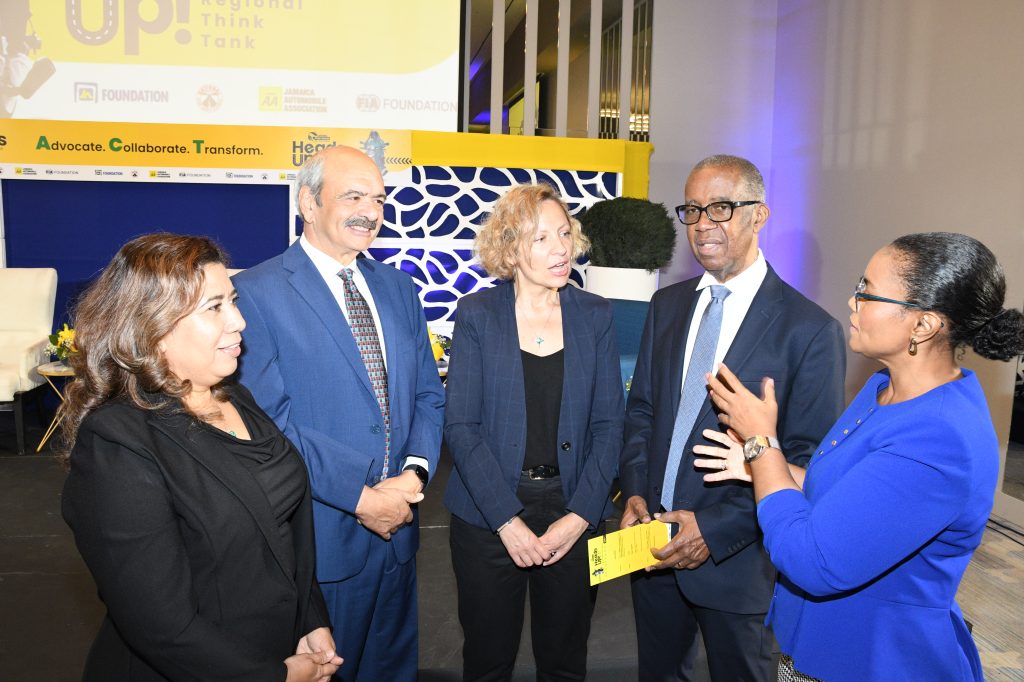‘We Must Change the Story’
JN Makes Stirring Call for Regional Effort to Tackle Motorcycle Deaths and Injuries
In a passionate address to stir up urgency, Claudine Allen, general manager of the JN Foundation, kicked off the Heads-Up Regional Think Tank at the AC Hotel in Kingston with a call for countries in the Caribbean and Latin America to shift the narrative on motorcycle safety to save lives.
Addressing policymakers, motorcyclists, and global road safety advocates, Ms Allen emphasised the urgent need for behavioural change to reduce preventable deaths.
“This is a journey of advocacy and action,” she declared. “The strategy is simple: safe helmets on heads. Every ride. Every time.”
The two-day forum, which culminated on June 20, was organised by the JN Foundation through the National Helmet Wearing Coalition. It comes amid rising concerns about motorcycle crashes across the Caribbean and Latin America. Motorcycle crashes account for close to a third of road fatalities in Jamaica alone, particularly the deaths of men in their prime, productive years a figure Miss Allen says has remained stubbornly unchanged.
“This is now an economic issue,” she stressed. “Our economies are already under strain, and these deaths are creating an invisible but heavy burden. We can’t afford to keep losing our most productive citizens on the roads.”
She highlighted the cultural reasons some riders still shun helmets, from vanity and discomfort to the myth that a short ride doesn’t require protection. She also pointed to systemic gaps, such as the need for certified helmet access, local testing facilities, and tighter enforcement.
But her message wasn’t just about the problems, it was a call to collective action.
“We have an immense task ahead, but it’s not insurmountable,” she said, pointing to successful efforts in other countries like Mexico.
“Over the next two days, we’re not just having a talk shop,” Miss Allen insisted. “We are identifying solutions- regulatory, cultural, economic- that will take us closer to zero.”

With representatives from transport, health, and national security ministries and sectors, as well as motorcyclists sharing their real stories, she said the forum is a critical step in changing the tide.
“We’re showing up. We’re asking you to participate. And when you leave here, take action. Advocate. Collaborate. Because that’s the only way we’re going to change the story that’s become too familiar,” she pointed out.
Supporting her remarks, Agnieszka Krasnolucka, programme director at the FIA Foundation, underlined the life-saving potential of helmet use. The Foundation is the charitable arm of the FIA, the world governed body for motor sports.
“We know that the safe use of quality helmets reduces the risk of death by over six times and brain injury by up to 74 per cent,” she said.
“That makes every certified helmet wearer a life protector. And yet, too many still ride unprotected not for lack of knowledge, but for lack of access and enforcement,” she added.
Ms Krasnolucka praised Jamaica’s efforts, saying, “This is the first event of its kind in the region, and it’s already proving that regional dialogue can drive real change. We are here to shape safer roads and more resilient communities.”
The urgency to tackle the motorcycle crashes and their consequences was further underscored by Donaree Muirhead, technical assistant in the Ministry of Science, Energy and Transport, representing Minister Darly Vaz, who outlined grim statistics regarding fatalities and injuries from motorcycle incidents so far this year.
“This is not just a national concern; it’s a regional crisis. The real issue is not motorcycles, it’s the persistent culture of non-compliance, limited access to certified helmets, and enforcement gaps,” she affirmed. We must build a safety culture from the ground up.”
The forum, hosted by the National Helmet Wearing Coalition, a project of the JN Foundation in partnership with the National Road Safety Council, with funding from the FIA Foundation, aims to tackle the challenge of motorcycle safety, particularly helmet wearing, head on, from helmet testing and enforcement to regional collaboration and youth education.
The event has brought together regional and international experts, policymakers, and advocates to tackle the alarming rise in motorcycle-related injuries and fatalities across the Caribbean and Latin America.






